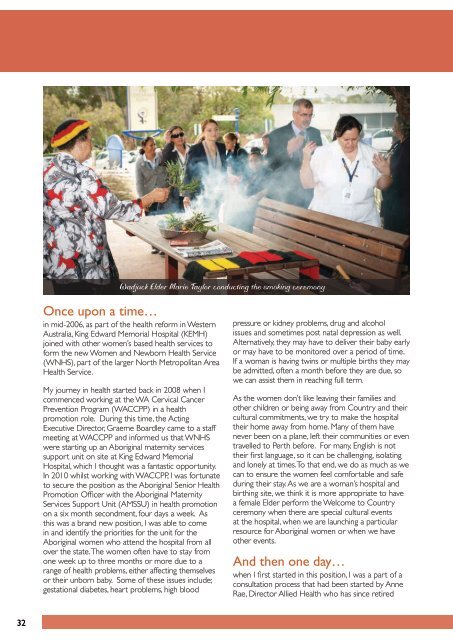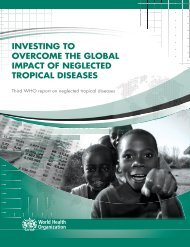INDIGENOUS STORYBOOK
The-WA-Indigenous-Storybook-7th-Edition2
The-WA-Indigenous-Storybook-7th-Edition2
You also want an ePaper? Increase the reach of your titles
YUMPU automatically turns print PDFs into web optimized ePapers that Google loves.
Wadjuck Elder Marie Taylor conducting the smoking ceremony<br />
Once upon a time…<br />
in mid-2006, as part of the health reform in Western<br />
Australia, King Edward Memorial Hospital (KEMH)<br />
joined with other women’s based health services to<br />
form the new Women and Newborn Health Service<br />
(WNHS), part of the larger North Metropolitan Area<br />
Health Service.<br />
My journey in health started back in 2008 when I<br />
commenced working at the WA Cervical Cancer<br />
Prevention Program (WACCPP) in a health<br />
promotion role. During this time, the Acting<br />
Executive Director, Graeme Boardley came to a staff<br />
meeting at WACCPP and informed us that WNHS<br />
were starting up an Aboriginal maternity services<br />
support unit on site at King Edward Memorial<br />
Hospital, which I thought was a fantastic opportunity.<br />
In 2010 whilst working with WACCPP, I was fortunate<br />
to secure the position as the Aboriginal Senior Health<br />
Promotion Officer with the Aboriginal Maternity<br />
Services Support Unit (AMSSU) in health promotion<br />
on a six month secondment, four days a week. As<br />
this was a brand new position, I was able to come<br />
in and identify the priorities for the unit for the<br />
Aboriginal women who attend the hospital from all<br />
over the state. The women often have to stay from<br />
one week up to three months or more due to a<br />
range of health problems, either affecting themselves<br />
or their unborn baby. Some of these issues include;<br />
gestational diabetes, heart problems, high blood<br />
pressure or kidney problems, drug and alcohol<br />
issues and sometimes post natal depression as well.<br />
Alternatively, they may have to deliver their baby early<br />
or may have to be monitored over a period of time.<br />
If a woman is having twins or multiple births they may<br />
be admitted, often a month before they are due, so<br />
we can assist them in reaching full term.<br />
As the women don’t like leaving their families and<br />
other children or being away from Country and their<br />
cultural commitments, we try to make the hospital<br />
their home away from home. Many of them have<br />
never been on a plane, left their communities or even<br />
travelled to Perth before. For many, English is not<br />
their first language, so it can be challenging, isolating<br />
and lonely at times. To that end, we do as much as we<br />
can to ensure the women feel comfortable and safe<br />
during their stay. As we are a woman’s hospital and<br />
birthing site, we think it is more appropriate to have<br />
a female Elder perform the Welcome to Country<br />
ceremony when there are special cultural events<br />
at the hospital, when we are launching a particular<br />
resource for Aboriginal women or when we have<br />
other events.<br />
And then one day…<br />
when I first started in this position, I was a part of a<br />
consultation process that had been started by Anne<br />
Rae, Director Allied Health who has since retired<br />
32



